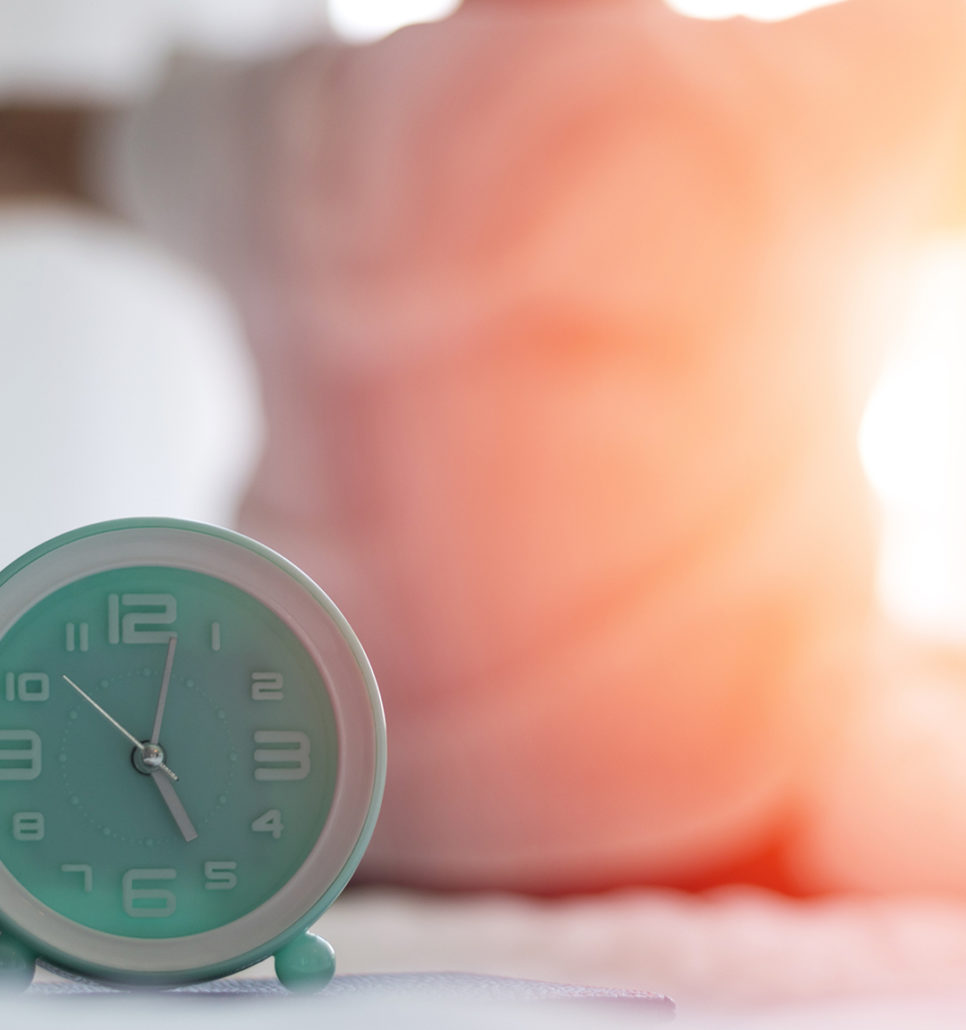Circadian Rhythm 101: Everything You Need To Know About How To Sleep Better
Did you snooze your alarm clock for an extra hour on November 1st? It’s when most of the United States falls back in time thanks to Daylight saving time.
Transitioning from Daylight saving to Standard time gives us an extra hour to catch up on those oh-so-precious z’s. However, sleep experts have observed quite the contrary to be true. Per a 2020 report from the Journal of Clinical Sleep Medicine, our circadian rhythm and internal clock struggle to adjust to this time shift for nearly a whole week.
But why does this happen? What is circadian rhythm and how does it function?
With shorter days and longer nights fast approaching, understanding circadian rhythm and its disruptors can be a functional tool to help you cope with potential sleep disturbances.
Here we explore everything you need to know about the body’s internal master clock, what happens when it is out of sync, and much more. Scroll down to learn how you can reset your circadian rhythm and change your relationship to sleep.
What Is Circadian Rhythm, Exactly?
Did you ever wonder how exactly your body keeps track of day and night?
Circadian Rhythm, your internal master clock, is what allows the body to perceive night and day.
This central clock resides at the base of the hypothalamus in a region with nearly 20,000 nerve cells and is referred to as the suprachiasmatic nucleus (SCN). Conveniently located in close proximity to the optic nerve, the SCN is able to receive optic signals and relay it to vital pathways governed by the sleep-wake cycle.

The quality of your sleep, productivity, metabolism, and even your immune system is directly regulated by your master clock which is exactly why circadian rhythm is important for overall health and wellbeing.
Why is Circadian Rhythm a 24 hour Cycle?
Circadian is Latin for around-a-day, referring to its repeating 24-hour cycle. Our internal clock syncs up with the solar cycle and Earth’s rotation which is why it is reset every 24 hours. Each morning, after a 24-hour cycle, your eyes respond to the first rays of the sun and signal the body the time of day.
What is Chronobiology? How is it Different from Circadian Rhythm?
We, collectively as a human race are photosensitive beings wired to fundamentally operate on rhythms. Our body and organ function are well-synchronized to the delicate but precise oscillatory cycles of the planet.
Seasonal changes and sunrise and sunset, on the surface, might appear to be separate planetary themes. Interestingly, however, taking a closer look at them allows us to tune in to how much we as a species rely on these cosmic patterns in everyday life.
Circadian rhythm is one of many oscillatory patterns that form the basis of essential molecular pathways in our body. For the sake of simplicity, it is best viewed as a subset of chronobiological patterns.
Chronobiology is the field of study that deals with biorhythms and how they tie in with planetary patterns. In addition to circadian rhythm, two other note-worthy biorhythms are the infradian rhythm (duration >24 hrs) and the ultradian rhythm (duration < 24 hrs, which governs hormonal release and metabolic pathways). Infradian rhythm in particular regulates both the lunar and the 28-day timing of the female menstrual cycle.
See how we can help you restore complete health of body, mind & spirit.
We’ll send you special offers and cutting-edge info on how to heal smarter.
Chronobiology and its Implications for Health and Disease
As an advanced modern society, many of the technologies we’ve created to enhance our lives, ranging from the incandescent light bulb to the latest smartphone, also act unwittingly, as biorhythm disruptors. Collectively we are harboring health issues arising purely from out of sync chronobiology.
Being out of sync with nature has far-reaching effects on our health and wellbeing; a few of which are seasonal affective disorder, chronic fatigue syndrome, sleep disturbances, endocrine dysfunction, and compromised immune function.
Let’s now take a closer look at what happens specifically, when the circadian rhythm falls out of sync.
Circadian Rhythm Disorder
Our always-on, gadget-hooked society is currently experiencing unprecedented levels of exposure to artificial lighting compared to previous generations.

In fact, in her book “Lights Out: Sleep, Sugar and Survival” TS Wiley describes artificial lighting to be the “ultimate endocrine disruptors”. The invention of the light bulb has created artificial signals which she believes to be the true villain of our modern society.
According to her, the way we are currently interacting with artificial light goes against our innate programming, and therein lies the root cause of new age diseases.
Other photosensitive species on the planet obey rhythms of nature. They rise and rest with the sun. Animals out in the wild are less prone to sleep disturbances and chronic health issues versus domesticated pets. Interestingly, in line with this train of thought, domesticated pets were also found to be prone to sleep disorders.
The Importance of Restful Regenerative Sleep
Did you know? Nearly 50-70 million Americans get less than the minimum recommended 7 hours of shut-eye per night. Given our increasing exposure to artificial frequencies, these numbers, although alarming, should not come as a surprise.
Rest is a powerful way to reset organ function on an everyday basis. Recurring regenerative sleep has long been known to be the foundation for health and healing. Also, sleep disturbances dramatically reduce our quality of life and can compound existing health issues. Yet, it is often the most neglected and ignored aspect of health.
Here’s What Sleeplessness Does to You
The effects of chronic sleep deprivation are real. In fact, evidence for a host of chronic illnesses from multiple research studies support TS Wiley’s hypothesis. Additionally, science has linked poor sleep to a high risk of cardiovascular disease, diabetes, hypertension, weight gain, and brain fog.
NREM sleep is when the body is able to heal itself, regulate metabolic pathways, and also clear the body of toxic build-up. Hustle culture and working late into the night at all cost is how poor sleep habits are formed. At first, it may seem easy to neglect sleep. What’s more, caffeine helps to compensate for the grogginess due to lack of sleep.
Tempting as it may be to trade in a few z’s for that extra deadline you committed to, it’s also necessary to be mindful of the hidden cost of those lost shut-eye hours. As our sleep deprivation adds up with age, the ability of our body to regulate basic redox reactions and repair DNA mutations slows down. In the long run, this forms the basis for ALL disease states.
Lack of sleep affects more than just our sleep-wake cycle alone. Among its other effects are its influence on mental health, inflammation, and even gut health.
How Sleeplessness Affects Mental Health
Accumulating evidence points to both a direct and indirect link between artificial light at night and mood disorders. Circadian rhythm disruptors such as bright light from screens have been proven time and again to be responsible for mental health issues such as depression and anxiety.
In a report studying severe forms of depression, a diurnal variation pattern emerged in patients. They either exhibited a morning-worse or evening-worse pattern. This clearly demonstrates a link between mood disorders and circadian rhythm.
Studies in rodents revealed a direct correlation between the onset of anxiety and an out of sync circadian rhythm. In support of this animal model study, night shift and persistent jet lag were also seen to trigger anxiety.
Sleeplessness Can Cause Inflammation
Diurnal variations in inflammatory Rheumatoid Arthritis (RA) symptoms are well established. Joint stiffness and swelling have been reported to be worse in the mornings. Patients with RA were found to have impaired cortisol secretion which explains an out-of-whack circadian rhythm cycle.
What’s more, did you know that your circadian clock is linked to gut inflammation as well? Your friendly gut bacteria composition is heavily influenced by circadian rhythm. Surprisingly, the opposite is true as well. Good gut health is necessary for regulation of the host’s circadian rhythm.
So far, we’ve learned the implications of circadian rhythm on health and disease.
But how does the master clock regulate so many pathways? What’s the mechanism involved? Are there more players?
Scroll down to understand hormonal regulation and the role of the pineal gland in the delicate balance generated by your master clock.
Hormonal Regulation of The Sleep-Wake Cycle
What hormone controls circadian rhythm?
A fine balance between the hormones cortisol and melatonin is how circadian rhythm affects sleep.

Exposure to sunlight first thing in the morning is a stimulus for the adrenal glands to release cortisol. Cortisol is the rise-and-shine hormone responsible for our state of wakefulness throughout the day. It’s highest in the morning and drops by twilight.
Melatonin, the second key regulator in the sleep-wake cycle is released by the pineal gland. Light spectrum changes during the sunset trigger its release which then induces a state of drowsiness by late evening.
In perfect health, this cortisol-melatonin dance orchestrates alertness and restful regenerative sleep. External interference in the form of dietary choices in the evening, caffeine intake, exposure to blue light, screen time, and EMF pollution throw off this intricate cortisol-melatonin pathway. It results in us being wired all night and tired during the day. And our ability to snag a perfect night of sleep is hindered. An out of whack hormonal regulation pathway, among other factors, is what causes insomnia.
A chronic bout of insomnia in turn further feeds into a vicious cycle of cellular pathway dysregulation. Oftentimes, this is an internal silent process for which visible symptoms are seen only after significant dysregulation.
How to Reset an Out of Sync Circadian Rhythm
Given the rising number of mental health issues and sleep disturbances during this COVID-19 pandemic, there is a clear need for us to do a circadian rhythm reset. We’ve listed a few ways to help you with this reset.
Circadian Entrainment
So, what is circadian entrainment? Perhaps, it sounds intimidating, but it is merely an act of intentionally exposing yourself to the right kind of light at the correct time of day, so your body can resynchronize with the solar cycle.
Sleep Supplements
1. Nadovim Regulates Circadian Rhythm
NAD+ (Nicotinamide adenine dinucleotide) is a vital coenzyme found in all living cells that depletes with age. Emerging research has shown a role for this key molecule in sleep regulation. Interestingly, a disrupted circadian rhythm leads to signs of anti-aging. And, many studies have proven that NAD+ supplementation normalizes whole body circadian signaling.

The unnatural deterioration of our bodies and minds due to technological advancements necessitates NAD+ therapy. To this end, Nadovim, Innovative Medicine’s NAD+ supplement can prove to be beneficial in resetting a circadian cycle that has gone awry.
2. Melatonin Supplements
Over-the-counter melatonin supplements can temporarily boost melatonin when the pineal gland is hindered in releasing endogenous melatonin in any way.
That said, in the long run, melatonin supplements are unable to entirely replace or even mimic endogenous melatonin. While they might not reverse chronic circadian rhythm sleep disorders, they are a great way to gently nudge your sleep-wake cycle, should it need one.
Use These 4 Biohacks to Help You Sleep Better Everyday
Sleepless nights can be incredibly frustrating. For this exact reason, we have listed 4 biohacks that are designed specifically to promote restful sleep.
Mitigate EMF Exposure
To say that we are experiencing an electromagnetic storm of never-seen-before proportion would be an understatement. Emerging research points to how these man-made low frequencies can alter cellular activity and even have carcinogenic effects. Here are 3 ways to mitigate EMF exposure. You can also check out Innovative Medicine’s Complete EMF Survival Guide to learn everything you need to know to protect yourself for the best night’s sleep.

Minimize Blue Light & LED Bright Lights After 6 PM.
Living life caveman style is possibly the only way to have zero exposure to artificial lighting. But we all know idealistic solutions don’t work. To this end, creating ambient lighting is one small step that can go a long way in promoting restful sleep.
If you are asking, “So, what’s the big deal about blue light?” Here’s what you need to know: blue light tricks the brain into believing that it is daytime. Eventually, melatonin release from the pineal gland is hindered, cortisol levels remain elevated, and the whole cycle is thrown off.
Living life caveman style is possibly the only way to have zero exposure to artificial lighting. But we all know idealistic solutions don’t work. To this end, creating ambient lighting is one small step that can go a long way in promoting restful sleep.
Reduce Use of Wearable Devices in the Bedroom.
Of the many perils of technological advancement is the need to be constantly tuned in to your heart rate and other health statistics. The truth, however, is that the deleterious health effects due to EMF exposure from wearable devices might outweigh the health benefits. Therefore, sleep experts recommend that wearable devices be preferably placed outside your bedroom before sleeping.
Stop Doomscrolling
Doomscrolling is when you are unable to control the urge to consume anxiety-triggering disheartening news/information. 2020 has seen a surge in this type of news consumption during the pandemic. Not surprisingly, this pattern also directly correlates to a rise in pandemic insomnia cases.
Establish a Night Routine for Melatonin Regulation
Aromatherapy, diffusing lavender essential oils, and reading a real book versus e-book or article on a digital screen are all practices that help wind down and promote a parasympathetic state conducive to melatonin release.
Establish a Morning Routine to Activate Cortisol
A morning routine is just as important as a wind-down night routine. Intentional exposure to the first rays of sunlight is a great way to stimulate cortisol production and get you to be bright and active throughout the day.
Ditch Caffeine After 5 PM
Caffeine is a known nervous system stimulant and so quitting its consumption after 5 PM is a no-brainer to promote restful sleep. Substituting your decaf with some calming herbal teas can be an effective way to get in a hot relaxing beverage before bedtime.

Bottom Line: Sync Up With The Sun
Honoring that we are energy beings in an invisible yet constant oscillatory flux with our environment is the first step to better health. At Innovative Medicine, we believe that getting back in sync with nature is the best therapy for bolstering the body’s innate resources and healing abilities.
The post Circadian Rhythm 101: Everything You Need To Know About How To Sleep Better appeared first on Innovative Medicine.
See how we can help you restore complete health of body, mind & spirit.
Lorem ipsum dolor sit amet, consectetur adipiscing elit, sed do eiusmod tempor incididunt ut labore et